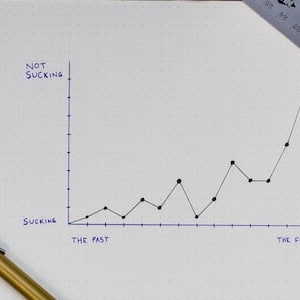drill down: Idiom Meaning and Origin
What does ‘drill down’ mean?
The idiom drill down means to delve deeper into a topic or issue, seeking more detailed information or a better understanding of a specific aspect.

Idiom Explorer
The idiom "look into" means to investigate or examine something in order to gain more information or understanding about it.
The idiom "into detail" means to thoroughly analyze or examine something, providing a comprehensive understanding of the subject matter.
The idiom "in detail" means to explain or describe something thoroughly or with great attention to specific information or facts.
The idiom "go down the road" means to pursue a particular course of action or explore a certain path or avenue in life.
The idiom "get to the bottom of" means to investigate or find out the underlying or true cause of something, often by thorough examination or questioning.
The idiom "get down to cases" means to start discussing or dealing with the practical aspects or the main point of a situation or problem.
The idiom "get down to business" means to focus on the task or purpose at hand, and to start doing what needs to be done without wasting time.
The idiom "get down to brass tacks" means to focus on the main and essential details or topics, especially when discussing or solving a problem.
The idiom "get down to bedrock" means to reach the fundamental or essential aspects of something, stripping away all unnecessary layers or details.
The idiom "find out" means to discover or obtain information by investigating or asking questions.
Unearthing Depths
The idiom *drill down* is commonly used in various contexts to convey the idea of delving deeper into a subject or analyzing information in a detailed and thorough manner. The origins of this idiom lie in the field of mining, where drilling down referred to the act of drilling vertically into the earth's surface to explore resources beneath the surface. Over time, this mining terminology has been metaphorically applied in different domains to describe the action of investigating a topic or data with increased precision and depth.
One of the earliest documented uses of the phrase *drill down* in a figurative sense can be traced back to the field of accounting. In the early 1970s, the term emerged as a way to describe the process of examining financial data to uncover underlying details or discrepancies. The idiom gained further prominence in the 1990s with the rise of computer technology and the advent of data analysis software. In this context, *drill down* is often employed to describe the action of navigating through data sets by progressively focusing on specific subsets or details.
In the realm of business and management, *drill down* has become a common phrase used to emphasize the significance of thorough analysis and investigation. It is frequently employed in discussions about decision-making processes, project management, and problem-solving. By encouraging individuals to *drill down* into a subject or data, the idiom emphasizes the need for comprehensive exploration and understanding before making informed decisions.
Besides business and finance, *drill down* has also found its way into other domains such as journalism, research, and even everyday conversations. The phrase is often used to encourage individuals to delve deeper into a topic, gather more information, and seek a comprehensive understanding. In journalism, for instance, reporters are often encouraged to *drill down* into a story to uncover hidden details, explore different angles, and provide a more nuanced perspective.
Considering its wide usage and applicability, the idiom *drill down* has become an integral part of the English language, signifying the act of conducting in-depth research, analysis, or investigation. It highlights the importance of thoroughness, attention to detail, and a comprehensive understanding of the subject matter at hand. By metaphorically borrowing from the process of mining, this idiom conveys the idea of going beyond the surface level to uncover valuable insights and information.
One related idiom that further emphasizes the concept of deep analysis is *deep-dive-idiom-meaning-and-origin/">deep dive*. Just like *drill down*, *deep dive* suggests a thorough exploration of a subject or problem, but with an added connotation of immersing oneself fully into the depths of the topic. It implies a more intense level of investigation, involving a comprehensive examination and understanding of all aspects and nuances.
Another related term that is often used synonymously with *drill down* is *deep-dive*. This hyphenated version of the idiom highlights the idea of delving even further into detail. It suggests a more focused and concentrated effort to uncover the most intricate and specific information, leaving no stone unturned. The use of the hyphen adds emphasis and depth to the concept of thorough analysis and exploration.
The idiom *drill down* is also frequently associated with the phrase *into detail*. When we say we are going to *drill down into detail*, we are emphasizing the need to examine the subject matter or data with great precision and depth. This phrase further highlights the significance of thoroughness and comprehensive analysis. It encourages individuals to pay close attention to the minute details and intricacies, ensuring a comprehensive understanding of the topic at hand.
While the idiom *drill down* has solidified its place in everyday language, its usage stems from specific historical contexts within mining, accounting, and computer technology. Despite its roots, the idiom's versatility has allowed it to transcend these contexts and find relevance in a variety of professional and personal settings. Its enduring popularity in the English language suggests a lasting significance, as it continues to be employed to emphasize the importance of thorough analysis and exploration in our increasingly complex world.
Example usage
Examples of how the idiom "drill down" can be used in a sentence are:
- When analyzing sales data, you can drill down to individual product level to understand which items are performing the best.
- The detective had to drill down through numerous eyewitness accounts to find the true sequence of events.
- To get a more detailed understanding of the company's financials, investors needed to drill down into the quarterly reports.
More "Technology" idioms



